Dryer sheets are a common household item that many people use to soften and freshen their laundry. However, they can be expensive and contain chemicals that some people prefer to avoid. Fortunately, there are many substitutes for dryer sheets.
This post may contain affiliate links.
One substitute for dryer sheets is wool dryer balls. These are made from natural wool and can be reused many times. They work by bouncing around in the dryer, separating the clothing and allowing air to circulate more freely. This helps to reduce drying time and static electricity, while also softening the fabric. Wool dryer balls can be purchased online or in stores, or they can be made at home using wool yarn.
Another alternative is to use vinegar. Adding a half cup of white vinegar to the rinse cycle can help to soften the fabric and reduce static cling. It can also help to remove any lingering odors from the laundry. While the vinegar smell may be strong at first, it will dissipate as the laundry dries.
The Downside of Using Dryer Sheets
Dryer sheets are a popular addition to the laundry routine. They’re designed to reduce static cling and make clothes feel soft and fresh. However, there are downsides to using them that are worth considering.
Related Article: How to Clean a Top Loading Washing Machine
Waste and Landfills
Dryer sheets are typically used once and then thrown away. This creates unnecessary waste that ends up in landfills. While they may seem small and insignificant, the cumulative effect of millions of used dryer sheets can be significant.
Harmful Chemicals
Many dryer sheets contain chemicals that can be harmful to both the environment and human health. For example, some contain benzyl acetate, which has been linked to pancreatic cancer. Others contain benzyl alcohol, which can cause skin irritation.
Impact on the Environment
The production and disposal of dryer sheets can have a negative impact on the environment. The manufacturing process requires energy and resources, and the disposal of used dryer sheets can contribute to pollution and other environmental problems.
Related Article: DIY Shout Stain Remover
Alternatives to Dryer Sheets
Fortunately, there are substitutes for dryer sheets that can provide similar benefits without the downsides. For example, wool dryer balls can reduce static cling and soften clothes without the use of chemicals. They’re also reusable, which reduces waste.
Other substitutes include using vinegar or baking soda in the wash cycle, which can help soften clothes and reduce static cling. These options are often more environmentally friendly and can be less expensive than dryer sheets.
Overall, while dryer sheets may seem like a convenient addition to the laundry routine, it’s important to consider the downsides. By exploring alternative options, it’s possible to achieve similar results without the negative impact on the environment and human health.
The Need for Alternatives
Many people use dryer sheets to soften clothes, reduce static cling, and add a pleasant scent to their laundry. However, there are several reasons why someone might need to look for alternatives to traditional dryer sheets.
Sustainable and Eco-Friendly Options
One of the primary reasons people seek substitutes for dryer sheets is to reduce waste and promote sustainability. Traditional dryer sheets are typically made from non-biodegradable materials and are designed to be used once and then thrown away. This can contribute to landfill waste and harm the environment.
Fortunately, there are several sustainable and eco-friendly options available. Some people choose to use wool dryer balls, which can be used repeatedly and are biodegradable. Others opt for reusable dryer sheets made from natural materials like cotton or bamboo.
Sensitive Skin
Dryer sheets often contain chemicals and fragrances that can irritate sensitive skin. People who experience skin irritation or allergies may need to look for alternatives that are gentle and hypoallergenic.
Natural substitutes like vinegar or baking soda can be added to the wash cycle to help soften clothes and reduce static cling. Alternatively, unscented dryer sheets made from natural materials like cotton or bamboo may be a good option for those with sensitive skin.
Related Article: Miracle Spot Remover
Residue Buildup
Another issue with traditional dryer sheets is that they can leave a residue on clothes and in the dryer. Over time, this buildup can affect the performance of the dryer and even cause a fire hazard.
Natural alternatives like wool dryer balls or reusable dryer sheets do not leave a residue and can actually help improve the efficiency of the dryer. Additionally, vinegar or baking soda can be added to the wash cycle to help remove any residue buildup.
Reusable Dryer Sheets
For those looking for an eco-friendly and cost-effective substitutes for dryer sheets, reusable dryer sheets are a great option. These sheets are typically made from fibers that can be washed and used multiple times, reducing waste and saving money in the long run.
One popular option for reusable dryer sheets is to use old t-shirts or other fabric scraps. Simply cut the fabric into small squares and add a few drops of essential oils for a fresh scent. These can be thrown in the dryer with each load of laundry and reused multiple times.
Another option is to purchase reusable dryer sheets made from eco-friendly materials such as bamboo or wool. These sheets can be washed and reused for up to 1000 loads of laundry, making them a great investment for those looking to reduce waste and save money.
Related Article: How to Remove Nail Polish from Fabric
You can make your own DIY dryer sheets by first cutting several sponges in half and placing them into a small container half full of water and half full of your favorite laundry softener. Place the sponges in the container and place near your dryer. When you are putting your laundry in the dryer, remove one of the sponges from the container and wring it out back into the container. Place the damp sponge in the dryer with the wet clothing. The laundry softener will still soften your clothes and remove static cling, but you will have used hardly any laundry softener at all. When you remove the sponge from the dryer it will be dry again. Place it back into the container for next time.
Overall, reusable dryer sheets are a great substitute for dryer sheets that can help reduce waste and save money in the long run. Whether using old t-shirts or investing in eco-friendly options, there are plenty of options available for those looking to make the switch to reusable dryer sheets.
Wool and Plastic Dryer Balls
Wool and plastic dryer balls are a popular substitute for dryer sheets. They are designed to improve airflow and reduce drying time, allowing clothes to dry faster. Dryer balls are reusable and can last over a year with proper care.
Wool dryer balls are made from 100% natural wool and are hypoallergenic, making them a great option for people with sensitive skin. They work by creating space between clothes in the dryer, allowing hot air to circulate more efficiently. This helps to reduce wrinkles and static cling, leaving clothes feeling soft and fluffy.
Plastic dryer balls, on the other hand, are made from hard plastic and have small nubs or spikes on the surface. These nubs help to lift and separate clothes, improving airflow and reducing drying time. They are a more affordable option than wool dryer balls, but they may not last as long.
Both wool and plastic dryer balls are easy to use. Simply toss them into the dryer with your clothes and let them work their magic. For best results, use 3-4 dryer balls per load.
Overall, wool and plastic dryer balls are a great alternative to traditional dryer sheets. They are eco-friendly, cost-effective, and can help to reduce drying time and energy usage.
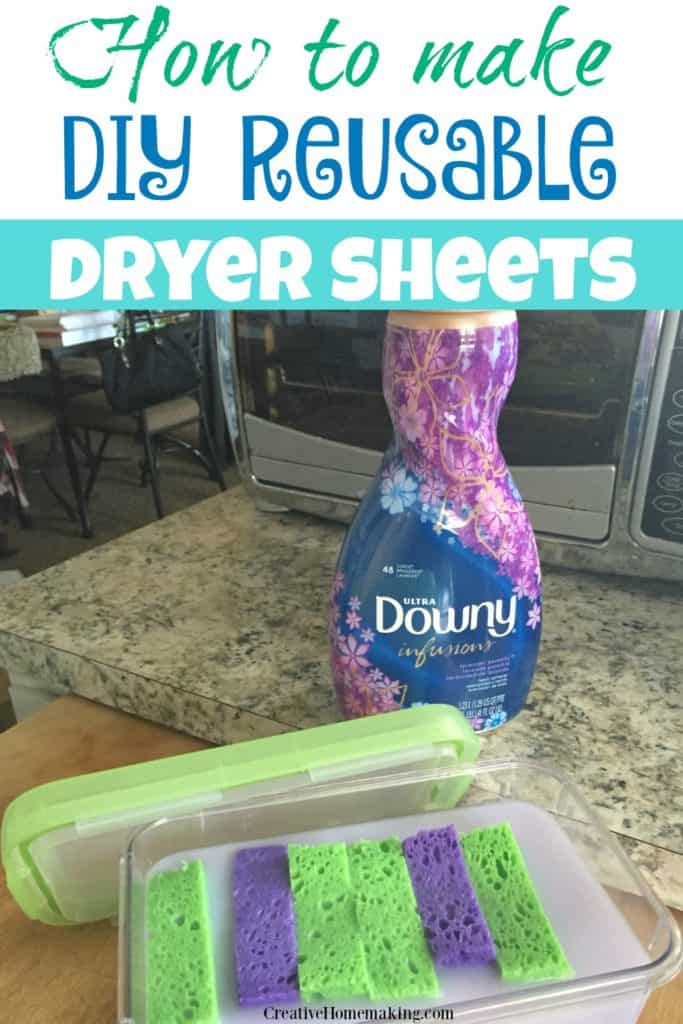
Other Natural Alternatives
Aside from wool dryer balls, there are other natural alternatives that can be used as a substitute for dryer sheets. These alternatives are not only eco-friendly but also cost-effective. Here are some of the popular natural alternatives:
Vinegar
Vinegar is a versatile household item that can be used as a natural fabric softener. It works by breaking down the minerals in hard water that cause clothes to feel stiff. To use vinegar as a substitute for dryer sheets, add half a cup of white vinegar to the rinse cycle of your washing machine. This will leave your clothes feeling soft and smelling fresh.
Baking Soda
Baking soda is another natural alternative that can be used as a fabric softener. It works by balancing the pH level of the water, which helps to soften clothes. To use baking soda as a substitute for dryer sheets, add half a cup of baking soda to the rinse cycle of your washing machine.
Overall, there are many substitutes for dryer sheets that are eco-friendly and cost-effective. By using these alternatives, you can reduce your environmental impact while still enjoying soft and fresh-smelling clothes.
Related Article: Removing Armpit Odors from Shirts
Reducing Static and Wrinkles
When it comes to laundry, nobody likes static or wrinkles. Fortunately, there are a few simple things you can do to reduce both.
One of the main causes of static is friction between clothes. To reduce this, try adding a tennis ball or two to the dryer. The bouncing motion of the ball will help separate clothes and reduce static cling. Another option is to add a damp washcloth to the dryer. This will add moisture to the air and reduce static.
To prevent wrinkles, try removing clothes from the dryer while they are still slightly damp. This will make it easier to smooth out wrinkles by hand. You can also try using a wrinkle-release spray. Simply spray the garment and smooth out any wrinkles with your hands.
Another way to reduce static and wrinkles is to avoid over-drying your clothes. Over-drying can cause static to build up and make wrinkles more difficult to remove. Try setting your dryer to a lower heat setting or reducing the drying time.
By following these simple tips, you can reduce static and wrinkles in your laundry and keep your clothes looking their best.
Related Article: Removing Lint from Bath Towels
In conclusion, there are numerous alternatives to dryer sheets that are effective, hypoallergenic, and environmentally friendly. By separating wet clothing and using items such as wool dryer balls or tennis balls, users can circulate air and reduce static cling without the use of traditional dryer sheets. Additionally, natural fabric softeners such as white vinegar or baking soda can be added to the wash cycle to soften clothes without the use of chemicals.
For those who prefer scented laundry, essential oils can be added to wool dryer balls or a damp washcloth in the dryer. This allows for a customizable scent without the use of synthetic fragrances found in traditional dryer sheets.
Related Article: Removing Cooking Oil Stains from Clothing
Frequently Asked Questions
Are wool dryer balls good substitutes for dryer sheets?
Yes, wool dryer balls are great substitutes for dryer sheets. They are reusable, eco-friendly, and can help reduce static cling and wrinkles. Plus, they can help reduce drying time, which can save you money on your energy bill.
How do silicone dryer balls compare to traditional dryer sheets?
Silicone dryer balls are another popular substitute for dryer sheets. They are reusable and can help reduce static cling and wrinkles. However, they may not be as effective as wool dryer balls at reducing drying time.
Can aluminum foil be used as a substitute for dryer sheets?
While some people claim that aluminum foil can be used as a substitute for dryer sheets, this is not recommended. Aluminum foil can be a fire hazard in the dryer and can also leave behind residue on your clothes.
What are some alternatives to dryer sheets for removing pet hair?
To remove pet hair from your clothes in the dryer, you can try using a dryer ball made of rubber or wool, or you can add a half cup of white vinegar to the rinse cycle. You can also try brushing your clothes with a lint roller or a damp sponge before putting them in the dryer.
How can I reduce static cling without using dryer sheets?
To reduce static cling without using dryer sheets, you can try adding a half cup of white vinegar to the rinse cycle, using wool dryer balls, or hanging your clothes to dry. You can also try reducing the amount of synthetic fabrics in your wardrobe, as these are more prone to static cling.
Follow my cleaning hacks board on Pinterest.
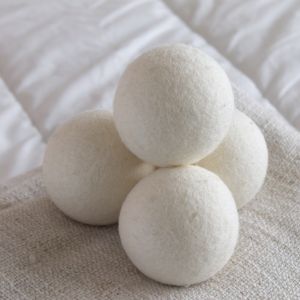
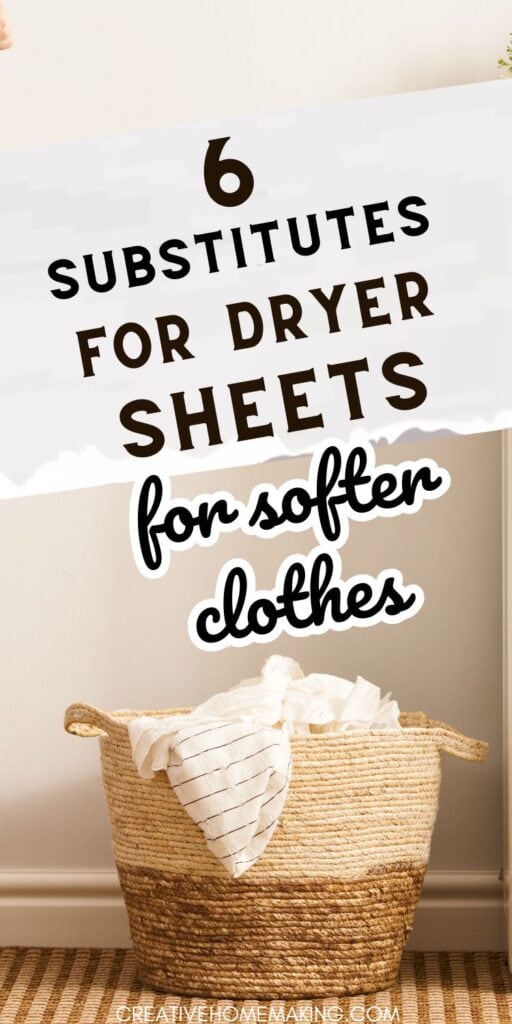
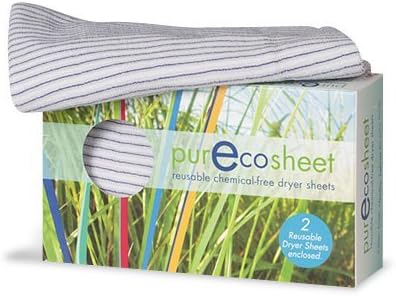

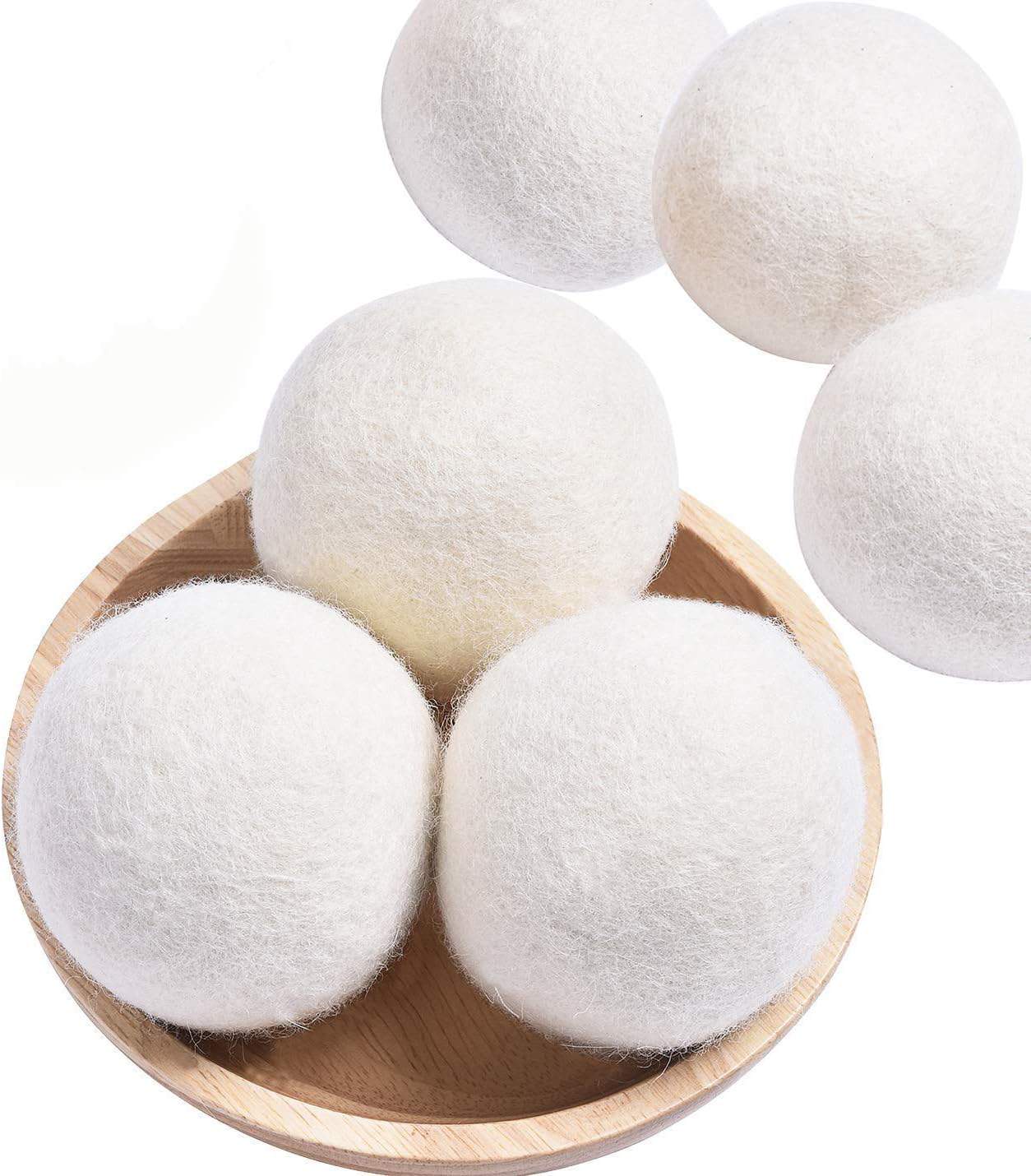
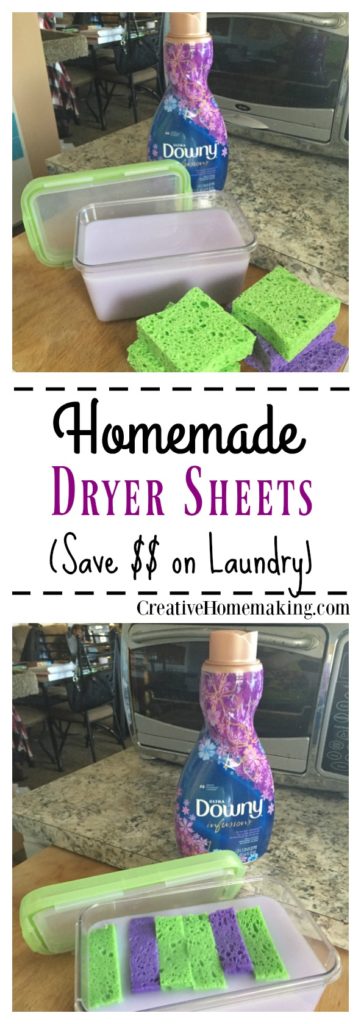


How do I keep from getting little mold spots in my container.
Did ever have the problem of the sponges falling apart with going in the dryer so many times?